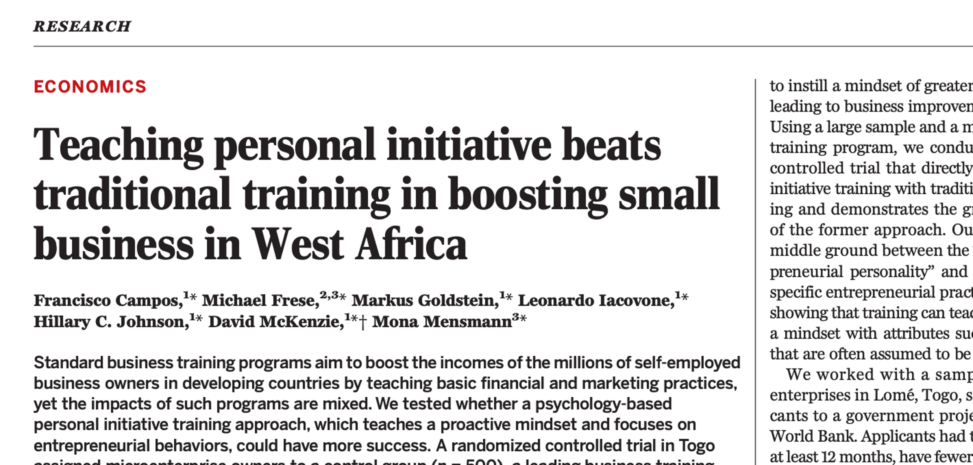If we look at the international indicators for countries with the highest percentage of the population between 18 and 64 years old who own their own business, we can easily conclude that in many regions of the world being an entrepreneur is a necessity and not a dream. In the data available for African countries, the percentage of entrepreneurs is much higher than that of more industrialized countries. In their book “Poor Economics”, the Nobel Prize winners A. Banerjee and E. Duflo characterize the paradox of the poor and their businesses: they are energetic and inventive and manage to do much with very little, but much of that energy is spent on too small and undifferentiated initiatives. The result is that they often do not provide enough income to meet the basic needs of those who work there.
Governments and entities like the World Bank spend billions of dollars on programs for these microentrepreneurs, to teach them good management practices such as accounting, stock management, marketing, sales, etc. There is, however, little evidence that this training has a significant contribution to increasing the profits of these businesses. On the other hand, studies on entrepreneurs show us little correlation between their success and their level of knowledge in management practices or in economic variables. In previous articles, have already mentioned the importance of factors such as the mindset and the process of thinking of successful entrepreneurs (“Do you have an innovation mindset”, 7-Jan-2019, and “How to think like an innovator”, 20-Mar-2018). Entrepreneurship education is focused on the development of this mindset and process of thinking.
A group of researchers from the World Bank and a German university decided to do an experiment to try to determine the differences between the impact of traditional management training and entrepreneurship education. To do this, they took candidates for a financing program of the World Bank in Togo to select 1500 microentrepreneurs for their study. The chosen businesses had an average monthly profit of $199, an average of 3 employees and 53% of the owners were women. They were stratified by gender, sector of activity and profits and, in each stratum, were randomly divided by 3 groups of 500 companies. Entrepreneurs in the first group received traditional training in management, those in the second group received training in entrepreneurship and the third group was used as a control group with no training.
The on-site training period lasted 4 weeks, followed by 4 monthly visits by trainers to each company. From then on, companies were followed up with 4 semi-annual surveys and the results after two years were surprising. The businesses of entrepreneurs who received training in entrepreneurship had an average profit growth of 30%, while those of entrepreneurs who received traditional training had an average non-significant increase in profits of 11%. In addition, entrepreneurs with training in entrepreneurship have created more new products with greater innovation and increased their access to credit. Interestingly, it was noted that this group also increased the use of good management practices. You can learn more about these results in the Science journal article “Teaching personal initiative beats traditional training in boosting small business in West Africa”, (F. Campos et al. 2017).
I recently used this work in a class that I give to Técnico’s first-year students to motivate them to seek value for society in the projects they will carry out throughout their engineering training, with the aim of increasing their entrepreneurial mindset. Since it was an online class, I was able to see in the exchanges of messages where some students discussed whether the propensity for entrepreneurship was born or made. In fact, just as the intelligence quotient increases between 2.7 and 4.5 points per year of schooling, entrepreneurial capacity can also be developed. There will certainly be some innate propensity for some of the aspects that contribute to an entrepreneurial mindset, but success in entrepreneurship requires the development of a variety of behaviours. Many of these microentrepreneurs in Togo will have been so under the circumstances, but they have been more successful with training focused on developing their personal initiative.
The results of this study in Togo should lead to reflection not only on how best to train microentrepreneurs in Africa but on how we prepare the next generations for the uncertainties of a global economy. Especially because last week’s winning Web Summit startup was founded and is headquartered in Ethiopia.
Adapted from my column in Jornal i of December 8th, 2020

 Português
Português